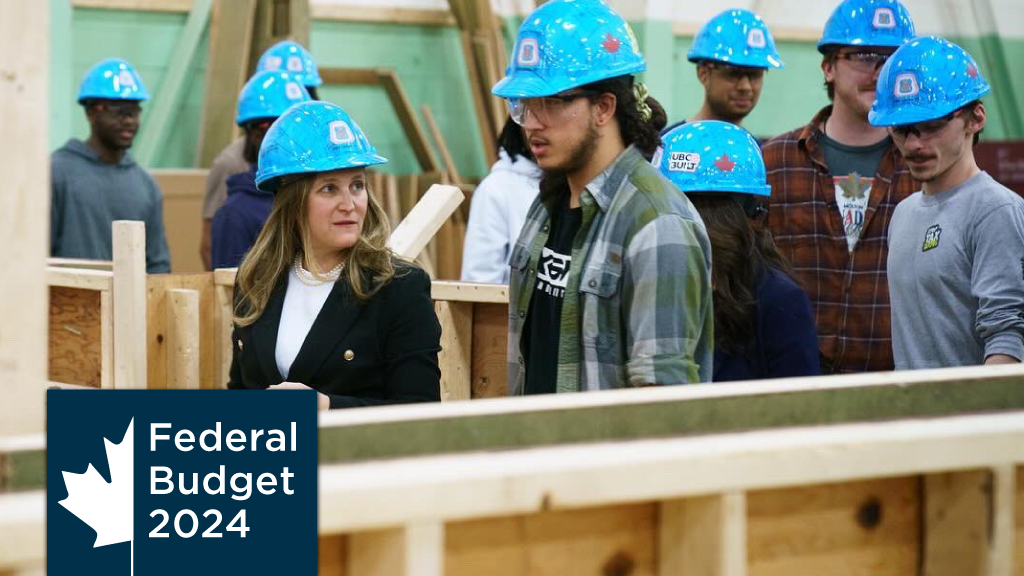The 2024 federal budget underlines the need to build more housing and provides measures and funding for getting more skilled trades workers to do so.
Billed Fairness for Every Generation, the budget was delivered by Finance Minister Chrystia Freeland in Ottawa April 16.
The budget proposes to provide $50 million over two years, starting in 2024-25, to Employment and Social Development Canada for the Foreign Credential Recognition Program. The funding builds on Budget 2022’s five-year $115 million investment.
At least half of the $50 million will be to streamline foreign credential recognition in the construction sector with a focus on homebuilding. The remaining funding will support foreign credential recognition in the health sector.
“Similar to a recent agreement between federal, provincial and territorial health ministers to recognize foreign credentials for health care professionals, the federal government is calling on provinces and territories to expedite removal of their barriers to foreign credential recognition,” the budget document states.
According to the budget, Canada recently undertook a review process for temporary resident programs to better align with labour market needs, protect against abuses in the system, and match the capacity to build new homes.
The government will also be setting targets both for the number of permanent residents it welcomes and for temporary residents.
Starting in the fall, the government will expand the Immigration Levels Plan to include both temporary resident admissions and permanent resident admissions with the goal to “ensure a well-managed, responsive, and sustainable immigration system to help balance housing supply with housing demand.”
“We also need to be sure that our temporary worker programs do not create a disincentive for businesses to invest in productivity, or drive down wages in Canada, especially for low-wage workers,” states the budget.
In order to reduce internal barriers for skilled workers in Canada, the federal government is also calling for provinces and territories to urgently streamline trades certification standards for interprovincial consistency, including streamlining requirements in trades, or subtrades, that have no or limited equivalents in other jurisdictions.
“The federal government will continue to collaborate with provincial and territorial apprenticeship authorities to improve labour mobility for workers in these trades,” the budget indicates.
Apprenticeship opportunities for the next generation
In terms of labour shortages, the budget points to data from BuildForce Canada that indicates the construction sector faces a shortage of over 60,000 workers by 2032, due to many workers retiring.
This is amplified due to the demand for accelerating home construction.
“To encourage more people to pursue a career in the skilled trades, the federal government is creating apprenticeship opportunities to train and recruit the next generation of skilled trades workers,” states the budget.
The budget proposes to provide $100 million over two years to Employment and Social Development Canada which includes $90 million over two years for the Apprenticeship Service to help create placements with small and medium-sized enterprises for apprentices. In addition, $10 million is being allocated over two years for the Skilled Trades Awareness and Readiness Program to encourage Canadians to explore and prepare for careers in the skilled trades. These programs would start in 2024-2025.
There is also the interest-free Canada Apprentice Loan and Employment Insurance Regular Benefits for apprentices on full-time technical training and the government will continue to explore options to make apprenticeships more affordable.
“Further investments to build Canada’s residential construction workforce, such as the recently launched Sustainable Jobs Training Fund, will help young workers gain the specialized skills needed to retrofit homes to increase energy efficiency and lower the costs of homeownership,” reads the budget.
In terms of jobs and skills training for Gen Z, to create 90,000 youth job placements and employment support opportunities, the budget proposes to provide $351.2 million in 2025- 26 for the Youth Employment and Skills Strategy.
The investments in youth job opportunities include: $200.5 million in 2025-26 for Canada Summer Jobs in sectors facing critical labour shortages such as housing construction; and $150.7 million in 2025-26 for the Youth Employment and Skills Strategy Program.
Labour disputes and work stoppages at Canadian ports
In 2023, to protect port workers and resolve the structural issues underlying port labour disputes, the government launched the first phase of a formal review in collaboration with industrial relations experts.
The budget proposes to provide $3.1 million over two years to enable the Labour Program at Employment and Social Development Canada to complete the second phase of its review. It aims to explore long-term solutions to minimize labour disputes, respect the collective bargaining process and secure the stability of Canada’s supply chains.
Follow the author on X/Twitter .












Recent Comments
comments for this post are closed